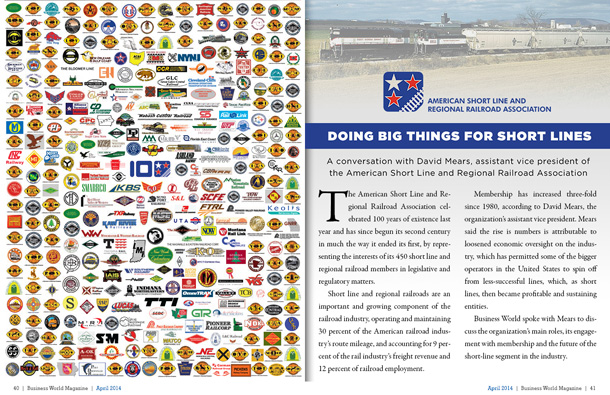
The Transportation Intermediaries Association (TIA) is the premiere organization for third-party logistics professionals in North America. TIA provides resources, information and connections for their members that empower them to better establish, maintain and expand ethical, profitable and growing businesses.
TIA was initially founded in 1978 as a way to advocate against stifling regulation in the U.S. domestic transport industry. While largely deregulated in early 1980, the association has continued advocating for market improvement ever since.
“Our members have grown over the years and we now represent the large integrated third-party logistics companies, as well as family-owned and smaller logistic companies,†says President and CEO Robert Voltmann, who joined the association in 1997.
“We’re the only organization that represents third-party logistics companies in every market – domestic and international.â€
Uniting the Industry
The TIA exists to help third-party logistics (3PL) professionals better manage their companies for growth and profit. The association’s membership consists of more than 1,300 such professionals, who they help by providing services that include research & education, lobbying, and specific product offerings that aid in the successful conducting of their businesses.
“We maintain a strong and growing association that continues to meet the needs of our members and the industry,†Voltmann says.
TIA offers a wide-range of services to meet the needs of their extensive membership. For some, the most important benefit of membership is advocacy, while for others it is educational products, or research, Voltmann explains. “It really depends on them. We try to meet the member wherever they need us to be,†he says.
One of the critical aims of the association is to educate and produce research necessary to help members meet the challenges of the competitive marketplace. Their education programs have been developed to assist in all levels of expertise in the industry. Online courses offered range from focusing on individual segments of the market, such as Temperature Control Transport, to their comprehensive Certified Transportation Broker (CTB) program.
All of the education programs TIA offers are designed to inform the next generation of industry leaders and provide industry standard education. TIA has partnered with the Institute of Logistical Management (ILM) to offer the highest of quality in transportation and logistics courses available anywhere.
The association also offers research that their members find invaluable. TIA’s Compensation Report, for example, provides important information about how logistics firms are organized, salary and compensation and information via position and geographic regions. “The TIA Compensation Survey is an essential tool for any 3PL owner that wants to retain employees and agents in the highly competitive 3PL employment environment,” Voltmann explains.
The association also provides leadership and direction for the 3PL industry and professionals to advance professional standards, business practices, and the overall image and credibility of the profession and its contribution to society.
Legislative Agenda
As part of their advocacy role, the Transportation Intermediaries Association works hard to protect their businesses from harmful regulation. To do that, they provide a strong voice for the industry to congress, the Obama administration, states, courts, shippers, carriers and various international organizations.
They have developed and maintained a positive relationship with the federal government over the years. As a result, TIA has been very effective in promoting their members’ interests through a number of successful policies they’ve worked on. “We do a very good job of advocating for our members before congress and the administrative agencies,†Voltmann says.
In a recent example, the TIA lobbied for a provision as part of the Fighting Fraud in Transportation Act of 2011 (FFIT), which was enacted and passed into law in July 2012. This bill addresses fraud in the marketplace, and raises the financial entry requirements for coming into the transportation industry, Voltmann explains. “It won’t block entry – it will just make it clear to those coming into the industry that this isn’t like running a sandwich shop.â€
TIA had a significant amount of input into the bill, and had worked on some of the included provisions for close to three years. “We think it’s going to have a very positive effect on our members and our industry,†Voltmann says.
Overcoming Challenges
One of the main challenges for the transportation industry is a growing shortfall in the number of trucks on the road. While TIA members have a sufficient number of trucks at the moment, that number is “tight†because of the economy, Voltmann says. “They seemingly were crawling out of the recession, yet my members are reporting that truck capacity is very tight in certain markets at certain times.â€
That tightness, Voltmann explains, is due to a couple of factors. Firstly, demand is high – “we’re exporting more so there’s more manufacturing,†he says. Secondly, a lot of capacity has been “idled†by trucking companies that went out of business during the recession, and by drivers who have chosen not to re-enter the workforce. The TIA is currently hard at work, looking at ways to remedy that shortfall.
TIA is also working on being more proactive in promoting their members. Last fall, they conducted focus groups with shippers to find out exactly what their perceptions were, so they could best tailor their message.
Looking ahead to the longer term, TIA’s five-year plan includes doubling their membership, and strengthening the velocity of their voice. That added strength that will serve them well as they shape the industry for years to come. “We will continue to work and be more proactive in promoting our members and their interests to the industry,†Voltmann concludes.







